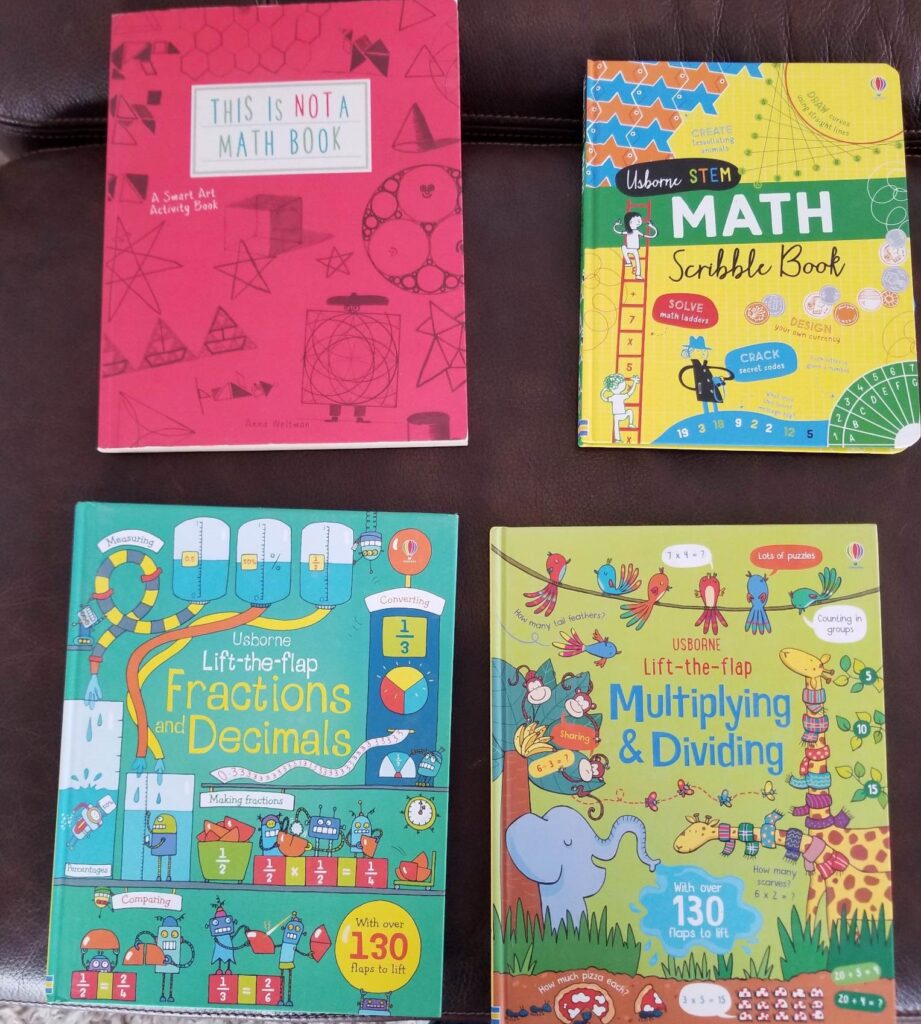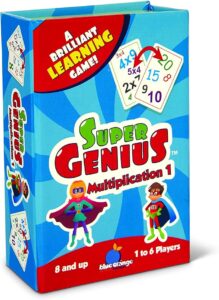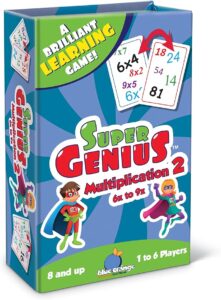Christian Unschooling: Math
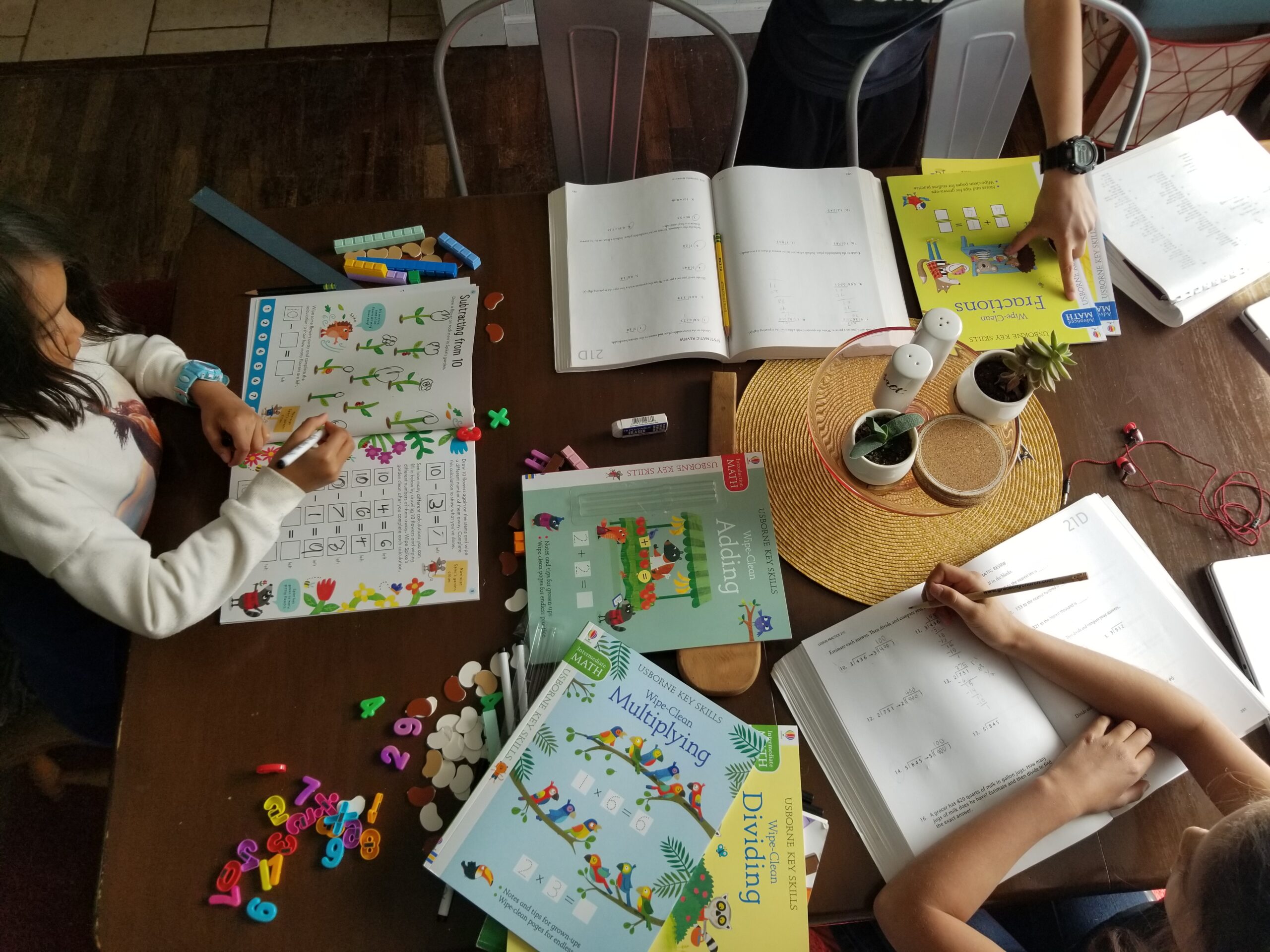
The “M” word, LOL.
Not gonna lie – it’s not a deep passion here. We like words better. And, hey, we live with calculators and Google!
When we first started homeschooling, I didn’t feel well-equipped to be able to teach math to my kids. I mean, I could manage things like tangrams and counting bears, but once they moved on from kindergarten, I needed help. And I wanted something that would serve my right-brain, visual, tactile learners well.
This post contains affiliate links and we may earn compensation when you click on the links, at no additional cost to you.
Math Curriculum as Unschoolers
That’s when I stumbled upon Math-U-See, which is what we’ still have in our home for many years.
We love this program because of Mr. Demme’s pre-recorded videos that literally spell out each step of a lesson’s concept, as well as the block manipulatives for a hands-on experience (which also end up being used for other things, LOL).
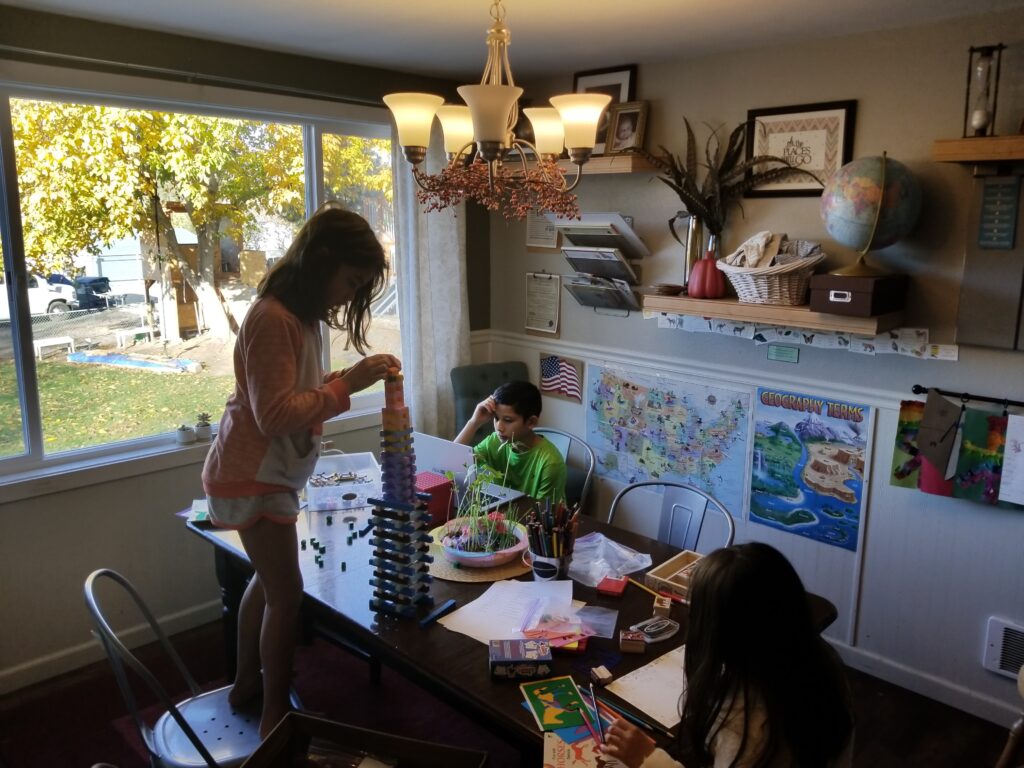
Honestly, even when we moved into unschooling, we kept going with Math-U-See because the kids actually loved it. Again, unschooling doesn’t mean we don’t use curriculum at all. If it is what my kids want, then that’s what we’ll do!
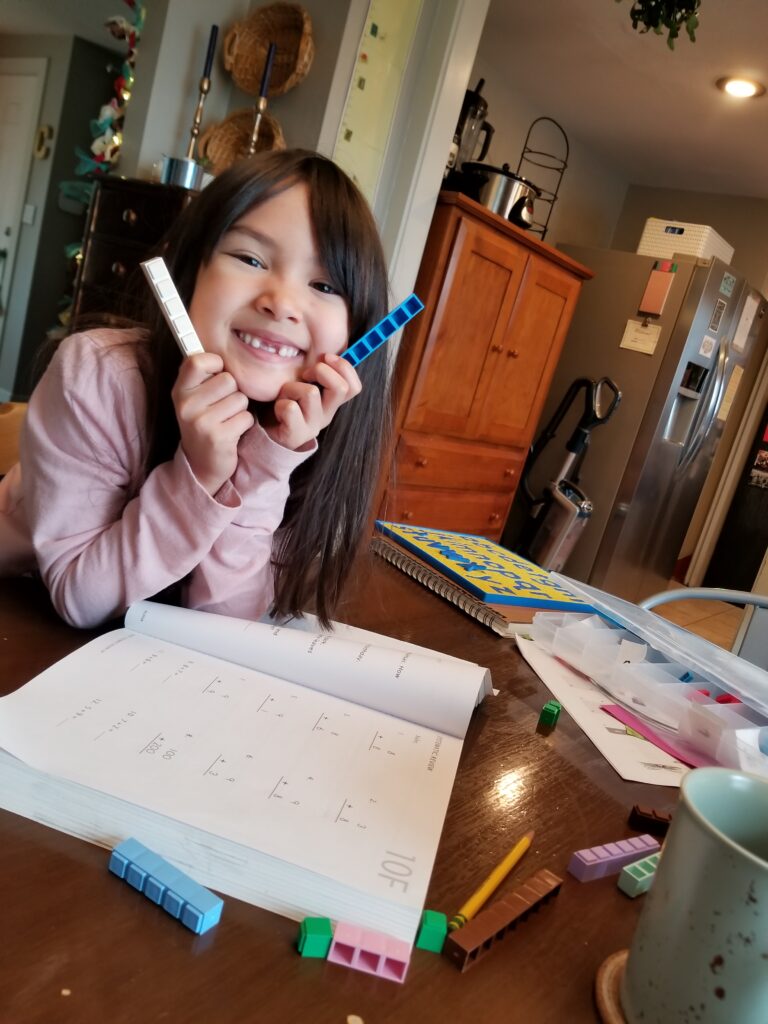
What we did change, however, was how we used it.
Before unschooling, I felt that pressure to make sure my Bigs did one lesson per week, and a whole lesson page each day. As we crossed over, I loosened up a bit and then had them do only half the problems in each lesson (I’d circle for them the ones I wanted them to do) and only a few times a week (of course, if they wanted to do more, they did). We finally made it to the point where our Math-U-See resources are simply a resource they have available here at home, to use as they feel compelled to.
If they want to watch a video lesson, they just pop it into the DVD player. If they want to use their workbooks, then they’ll pull them out. But these are just some of what’s in our arsenal of resources that they can choose from each day.
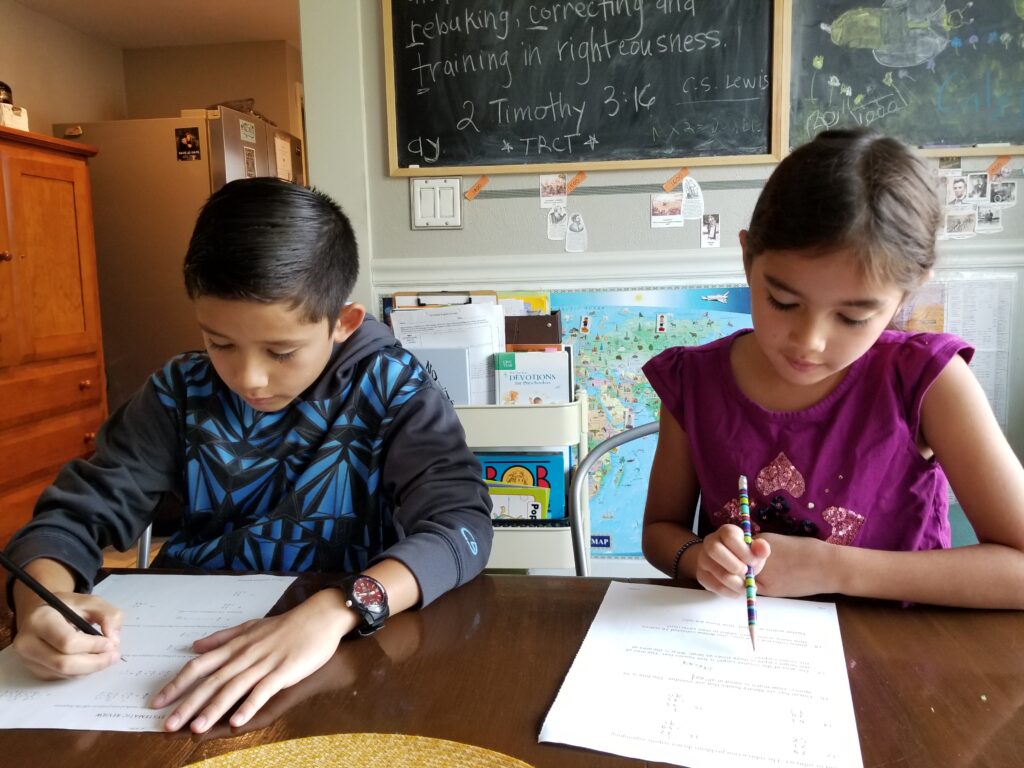
What it looks like right now, at the time of this writing: Big Bro and Baby Sis are both going at their own pace; Big Bro (currently 16) is going through Algebra 1 and Baby Sis (currently 11) is going through Epsilon. They’re the ones who decide if they’re going to incorporate this program into their day or not; and if so, how much of it they do.
Big Sis’ journey looks different …
A True Unschooling Math Story
Big Sis Quit Math
Big Sis is our ultra-creative but never really had a problem with learning math when she started out. In fact, she seemed to grasp concepts easier and quicker than Big Bro for a while!
I don’t know what happened, but towards the end of 6th grade, her desire for learning formal math concepts literally died. We had already loosened up with how we did math but for some reason, she just hit a wall.
I had a choice to make. Force her to keep going – even if it was just a tiny bit a day – in the name of diligence and perseverance, or trust the process and her, letting her take a break from it all.
It was scary, but I also had firm convictions about childhood education at this point. I also knew my girl well enough, and that – for her – when she hits a wall, she needs time away. So, after processing and praying, I let her stop. Cold turkey stop.
Of course, she was (is) still always learning through practical, everyday experiences: volume and fractions from her baking/cooking, measurements from her sewing, geometry and spatial reasoning from all her Barbie-house making (she went through a season of building Barbie houses and rooms with scenes out of foam board), how to save and budget and handle cash, etc. We also played lots of games and she did like occasionally tackling pages from the variety of the interactive Usborne math books we had on hand.
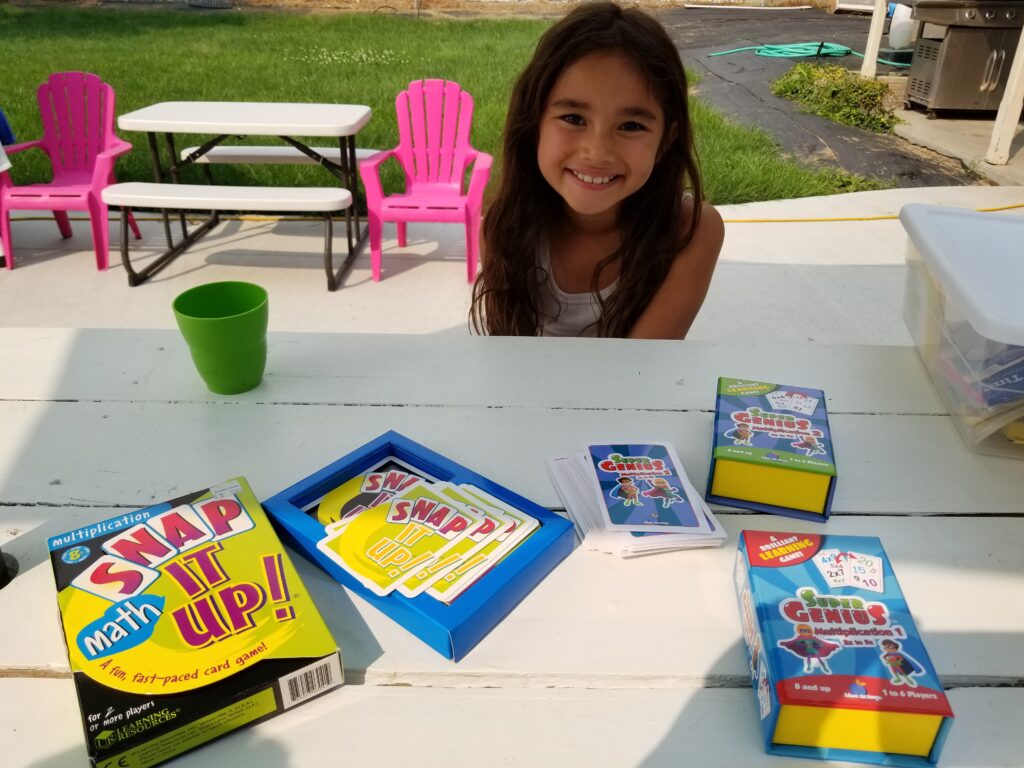
But she wasn’t “progressing” or being challenged the way her siblings were, as they continued to learn new concepts. In fact, I semi-panicked when I realized Baby Sis (who is 3 years younger than her), was narrowing the gap between them.
I tried encouraging her along the way to try again, but it was always a hard no, and I felt God leading me to let things be. This went on through 7th grade.
This is also when I really had to lean into the tenets of self-directed learning. Studying the unique person she was, trusting that she will progress as God leads her, laying down expectations I had, clinging on to the reality that she really was learning all the time, but in the distinct way God had purposed for her. It was truly an exercise in surrendering and letting go of any control I thought I had, while simultaneously assessing where I needed (if I needed) to challenge her.
How Shopping at Target Led Her Back
Finally, we were at Target one day and she was wanting to purchase a couple items. She was trying to determine if she had brought enough money with her. We were in the middle of an aisle when she asked me whether she would have enough, after sales tax was applied (because the subtotal of her potential purchases were pretty close to what she had in her wallet).
Instead of answering her, I gave her the sales tax percentage and challenged her to calculate (using estimation) to come up with a round number to get a close idea. She could not do it. She knew how to add and multiply, but she didn’t know the specific process/formula to get the specific answer she needed. I tried to walk her through each step of the calculation, but by that point she was defeated and emotional, which only further blocked her thinking, adding to the frustration. She even bargained by asking me to spot her for the purchase and that she would pay me back after she figured out the total when we got home, when she had more time.
But my mom gut told me that this was a real-life lesson she needed to learn. That simple, mental math calculations are a life skill, and that mom wouldn’t always be there to help her out. She walked out of the store with nothing, and I walked out of the store with a disappointed and frustrated daughter.
You know what happened? That experience made my girl realize the value of math in real life and compelled her to take the initiative to get back to learning math concepts, all without me forcing her to. No joke, when we got home she pulled out our math books!
She still goes at her own pace, but she has been diligently and consistently working away at growing her math knowledge (she primarily uses Teaching Textbooks now, but will also watch our Math-U-See DVDs and YouTube videos and use other math resources we have here at home).
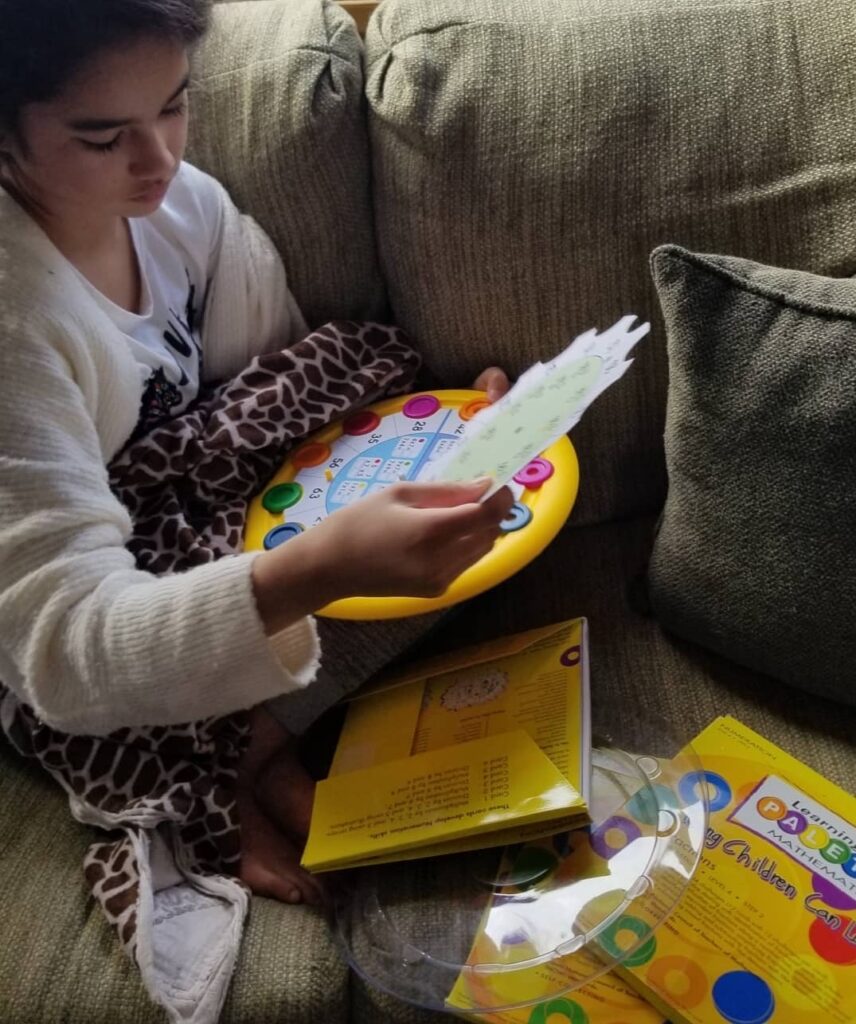
And she is retaining and remembering way more this way, because she is the one leading her learning! Deep down, I know that if I had made her continue in – even in a gentle way – not only would she not be really learning much, but would grow cold towards learning overall. She would only be doing math out of obedience but not truly learning with her heart.
Trust the Process
Before this personal experience, I had heard similar stories from other veteran homeschool moms – where they let their children take breaks or used a more organic approach to math learning, but then pick it back up when they were compelled to do so (for example, because they wanted to take a class for something they were passionate about that required math as a prerequisite). Not only did they pick up their math learning, but they learned more deeply than they ever would have if they had kept to standard methods, because there was internal motivation present!
Unschooling Math Mindset
This home educating journey is not just for the kids but for me as well. My own mindset has grown as we have continued on this natural learning path.
First, I had to challenge my crew (and myself) to change our perspective about math; that it’s really just like language … but with numbers! That it isn’t a “necessary evil” but part of God’s design for the world. That math is a beautiful aspect of creation and living. Having this positive perspective for something that seems so dry and boring has helped us, particularly when it comes to doing “more formal” math learning.
With all that said, I have learned to let my kids lead the way. I’ve learned to discern where to let them be, as well as to discern when God wants me as their mentor/guide to push them a little … always remembering to trust and honor how God uniquely created each of them, and therefore the learning journey He has them on.
What Unschooling Math Looks Like in Our Home
Because we started out our home educating journey with a formal math program, that is a muscle we exercised and found comfort in. Like I mentioned above, there is now a very relaxed approach with incorporating program lessons into our rhythm. Sometimes the kids will tackle lessons day after day, sometimes they will set them aside for a while and use other resources as they naturally fit into their days. The whole idea here is freedom to pursue as they feel led.
But besides that, a bigger chunk of their math learning comes from everyday life experiences and/or personal passions (and which can’t necessarily be documented on a worksheet or tested):
- Time in the kitchen (Baby Sis loves making mini treats, so will take recipes from cookbooks and have to fraction out the right measurements)
- Trying out gardening (at a previous home we lived at, the kids each had a garden bed to call their own and would diagram on graph paper how to plot out what they were going to plant)
- Creating 3-D models (like houses for dolls and action figures, required knowledge of geometry)
- Managing personal finances and their own personal budget, as well as learning how to handle cash at the store (all three kids now pay for all their own personal purchases that are not part of our family budget)
- Trying out entrepreneurship (my girls love participating in our local kids maker markets and have learned all about cost of goods, how to price inventory, what profit and “being in the black/red” means, what percentage of earnings to set aside for re-investing into their little businesses, etc.)
- Investing (Big Bro has been trading stocks since he was a tween and has learned math related to that, as well as to real estate – which is what he will pursue when he finishes homeschooling)
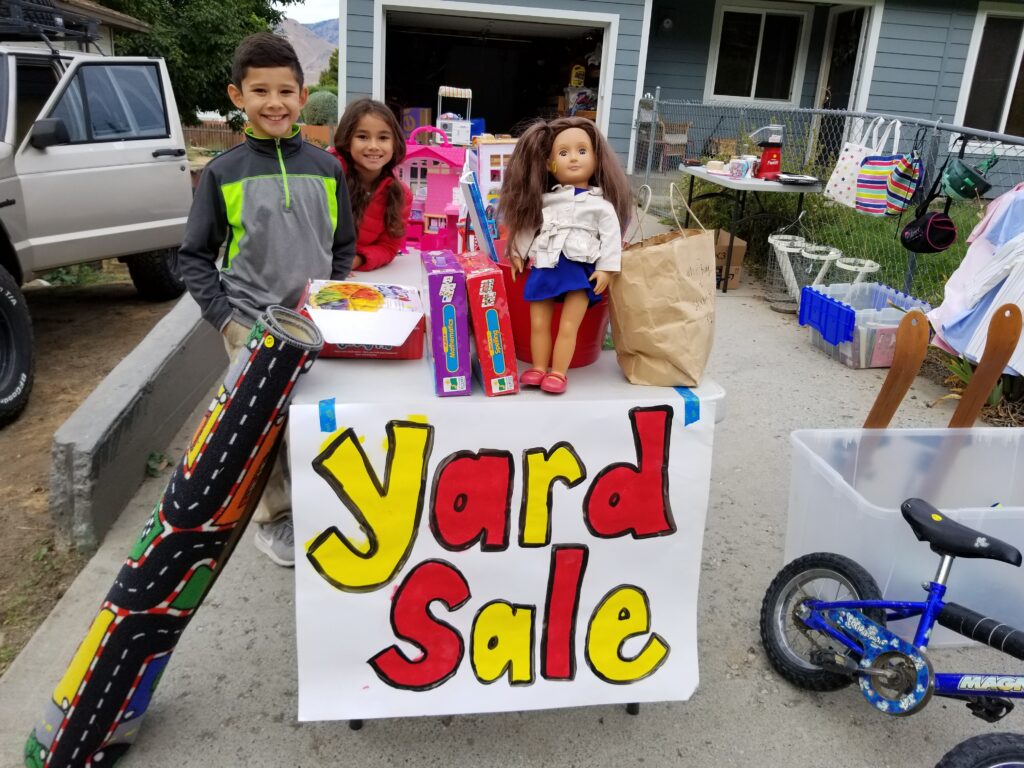
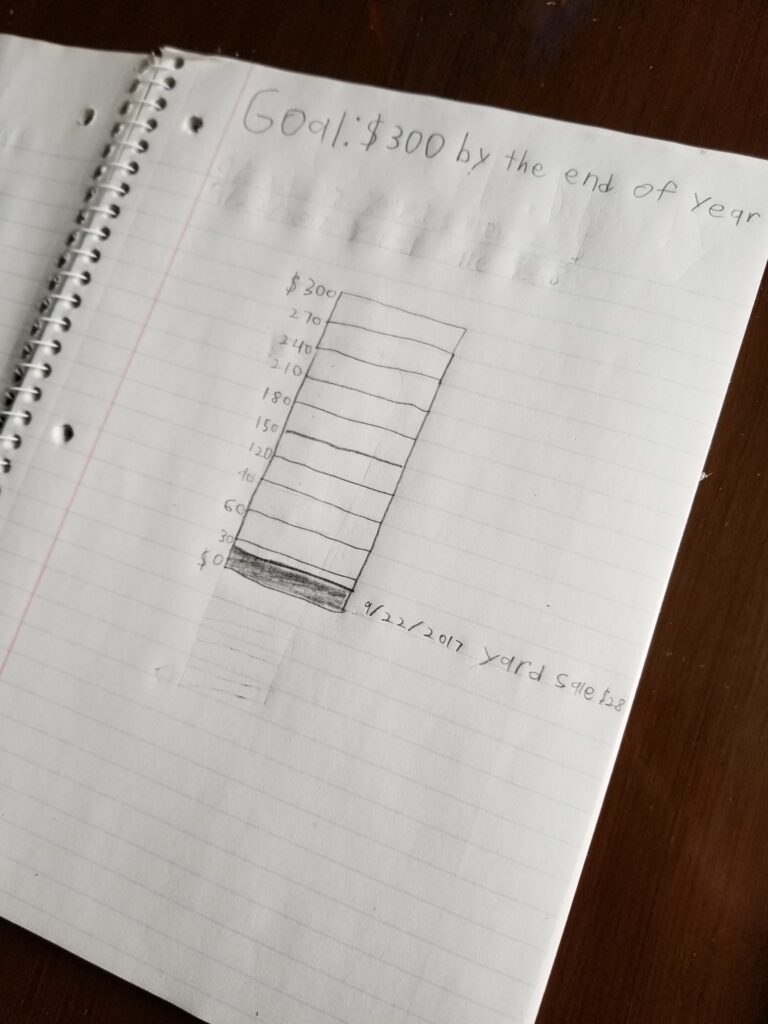
Honestly, as long as they understand survival and consumer math, I’m no longer concerned about them having to need to know higher levels of math. We’ve raised them with a stewardship mindset, trained them in taking initiative and in resourcefulness, and have emphasized living intentionally and faithfully for God’s glory – which are all foundational in training them to lead their own education. My perspective now is that they will learn according to their need to learn.
Whether it is math, or any other subject, I trust that as long as they possess these certain core values and convictions, God will lead them to not only desire, but acquire, whatever knowledge and wisdom He would want them to be equipped with every step of the way.
Tools and Resources We’ve Enjoyed as Christian Unschoolers
Besides Math-U-See, here are some other tools/resources they have used as part of their unschooling journey:
We love Usborne for their interactive and engaging resources. Between lift-the-flap books, fun activity books, journals, and more … you’re kids will enjoy learning and reviewing math.
This is such a fun resource! These palettes have self-correcting discs. And there are a whole bunch card sets to choose from. Besides math, we’ve also used them for language arts!
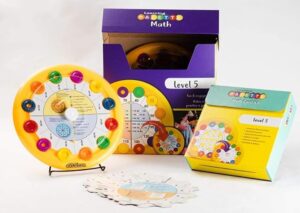
This was another favorite in our home of tactile/hands-on learners, especially when learning basic arithmetic.
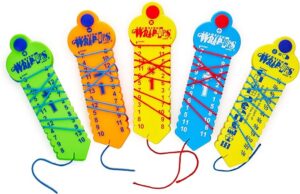
Blue Genius Multiplication 1 and Multiplication 2
Not only learn multiplication facts but also build processing speed with these exciting card games.
Math made fun with this highly engaging game that challenges kids to both learn AND level up on their math facts!
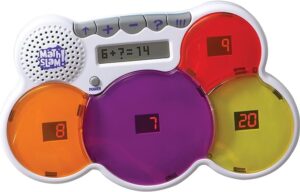
These are great for making comparisons between partial numbers to whole numbers as well as learning how to add and subtract fractions!
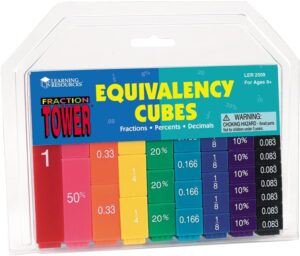
(LOL, okay, not really, but since we don’t have a ton of wall space or a dedicated homeschool room, my girls actually enjoyed using these posters as “giant flashcards” as a silly and fun way to review basic math concepts!)
March 2024 Update: ANOTHER Unschooling Math Story with Big Sis
Sooo, since I shared the story of Big Sis taking a break from math between the end of 6th grade through the end of 7th grade … she took yet another big break with her math activities!
She was very diligent from the time of the Target situation until about the middle of her 8th grade year, when – again – she decided she wanted to take a break from her formal math learning (when I say “formal”, I mean doing the lessons from curricula … there are obviously plenty of real life math application opportunities between her cooking, baking, personal budgeting, shopping, creating, building, etc.).
This time I knew better and didn’t stress over it as much as I did the first time. Yes, even as she got closer to high school! I kept going back to the fact that God wired her the way He did and constantly asked for wisdom over whether this was an issue of her needing to be challenged or her truly not thriving (and, thus, truly learning) in her activities.
Well, her second break lasted another year, from the middle of 8th grade until the middle of this year, which is her 9th grade year.
One day, early this past December, she told me that she wanted me to order the next level of Teaching Textbooks because she wanted to “do math” again. Her reason? She has been mulling over the idea of going to college to study film. And because she knows that colleges look at transcripts, she wants to be prepared in the event she does pursue higher education. After praying for direction with what to do, she felt God telling her to keep her options open by making sure her bases are covered in these high school years.
She even has an action plan for doubling up on lessons so that she can finish the current level she is on by the end of this school year and intends on going through the next one through the summer. That way, she will be ready to start her 10th grade year “on track”. (I’m proud to report she has been consistently working her action plan for the last three months!).
My point in sharing this updated story is to inspire you with what learning can look like when you let the child lead, but you are intentional about cultivating a stewardship mindset over their lives. This is a testament to the notion that when a child has objectives that are meaningful to him/her, there is intrinsic motivation to do what is necessary to accomplish those objectives, even if it isn’t fun or truly a passion (which is the case for Big Sis).
She could care less about completing high school math by the standards society has. But she does care about being a creative (which is clearly what God wired her to be) and is interested in the idea of pursuing a career in film and in being able to tell the world stories in a way that reflects The Bigger Story. And even if a college degree isn’t necessarily required to pursue that vocation, she wants to leave her options open, so that she can study filmmaking at a college if that where God ultimately leads her.
Each family (and each person in each family!) – is different. Therefore, unschooling math (unschooling in general) is going to look different in each home. But I hope sharing what it looks like for our own family helps you see what it can look like!
If you came to my blog through a medium other than Instagram, I invite you to follow me there, because I share more often on my social media than on the blog these days!

